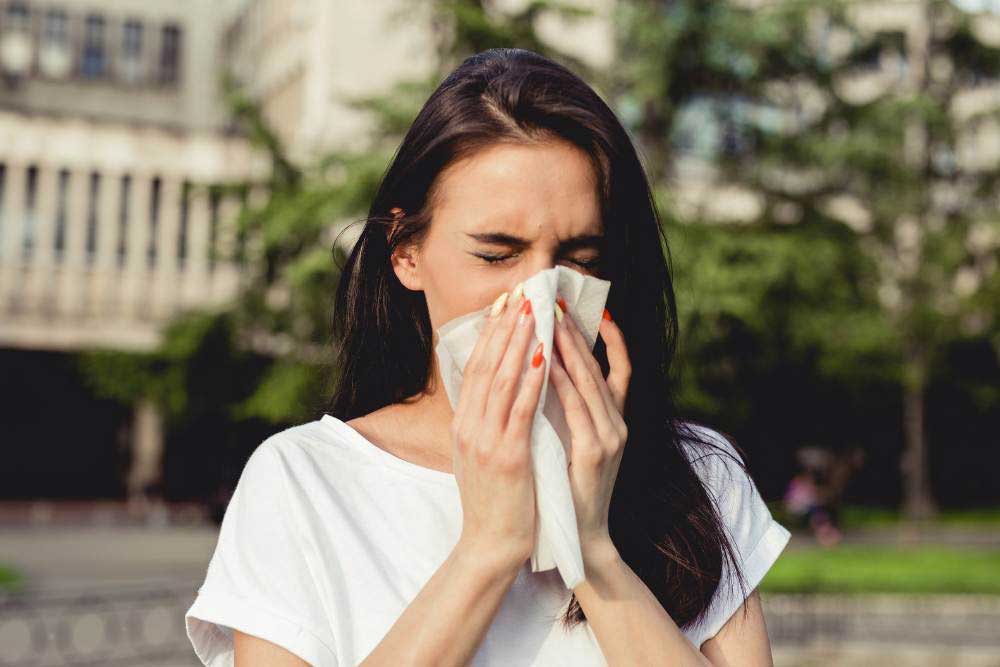Managing Allergies through Diet

Allergies can be a significant burden, affecting millions of people worldwide. While medications can help alleviate symptoms, adjusting your diet can also play a crucial role in managing allergy symptoms and reducing inflammation. This article explores the connection between diet and allergies, with the example of the benefits of eliminating edible grass ingredients—grains, corn, and sugar cane—during seasonal allergy season.
As a child I can distinctly remember sitting upright in my bed at night during the allergy season (hay fever) to be able to breathe better. I was careful to get back indoors before dusk, so that I wouldn’t have a ‘head full’ of pollen. During the day it seemed to lessen, but if I was near a yard where someone was mowing their lawn, I would hold my breath and ‘run for the hills!’ My reactions were much less severe than my older sister, who stayed indoors a lot during these times of the year. Everyone thought she was just a lover of reading, but I knew better. She was trying to make sure she could breathe.
Not a lot was made of most people’s seasonal allergies back then, but it was a problem for us and for others. When there was an increase in people who were dying from asthma, then more attention was paid to them. Pharmaceuticals and steroids were utilized, as well as pills, inhalers, and then allergy shot regiments to combat the problem. Yet the people affected are still growing today. Maybe we haven’t properly addressed the root problem?
I say this as a person who has successfully naturally mitigated about 95% of my seasonal allergy reactions. I achieved this through diet changes. There is still a short period of time in the spring and fall where I do take allergy pills so that I have absolutely no symptoms and can freely enjoy the full day outside without symptoms. Personally, I love a good walk in the spring and fall when there is a cool breeze, and the plants and flowers are in full bloom.
Although my first preference is to treat health issues naturally, I do absolutely believe that there are times when a combination of natural and conventional medicine produces the best results. My hope is that someday we will find a way to collaboration of natural and conventional medicine to treat the whole person most effectively. Until then, most of us must learn and manage the combination ourselves.
Seasonal allergies, often referred to as hay fever or allergic rhinitis, occur when the immune system overreacts to airborne allergens such as pollen, dust mites, and mold spores. Common symptoms include sneezing, runny or stuffy nose, watery and itchy eyes, itchy sinuses or throat, and ear congestion and/or infections. If you are a person who not only reacts to pollen, but additionally is allergic to molds, as is the case in many in my family, this becomes a sort of ‘double-whammy’ time of year.
In some cases, seasonal allergies can also cause more systemic symptoms such as fatigue, headaches, and body aches due to the inflammatory response triggered by allergens.” Allergies occur when your immune system reacts to a foreign substance — such as pollen, bee venom or pet dander — or a food that doesn’t cause a reaction in most people.” (Mayo Clinic) Another often overlooked symptom of seasonal allergies can be painful joints, which the medical community refers to as inflammatory arthritis. In an article by creakyjoints.org, the category at the top of the site talks about merely living with this condition. But what if the foods you eat are not only part of the problem, but adjusting your diet is part of the solution to this condition?
Diet choices influence inflammation and immune responses in the body. Certain foods have anti-inflammatory properties that can help reduce the severity of allergy symptoms. For example, foods rich in omega-3 fatty acids, such as fish, flaxseeds, and walnuts (if you do not have a problem with nuts) have been shown to have anti-inflammatory effects. Proceed with caution eating nuts if you also have an allergy to mold. Nuts mold easily and the resulting molds can be hard to detect with the naked eye.
Conversely, foods that the body might have a sensitivity with can exacerbate inflammation and allergy symptoms. Grains, corn, and sugar cane, all of which are classified as edible grass ingredients, can stimulate the immune system, and increase histamine production, leading to worsened allergy symptoms. Think of it this way, if you breathe grasses and get a runny nose and itchy eyes or throat, then if you eat said grasses (wheat, oat, rye, millet, sorghum, barley, teff, corn, rice, and sugar cane) you may be causing an inflammatory response in your digestive system as well. Many people have high levels of inflammation all the time and have incorrectly decided they are overweight rather than chronically inflamed.
Reducing or eliminating edible grass ingredients can help reduce the body’s inflammatory response and mitigate allergy symptoms. Here’s a closer look at why these ingredients can be problematic:
–Grains: Common grains such as wheat, barley, and rye contain gluten, a protein that can trigger an immune response in sensitive individuals. Even in those without celiac disease, gluten can cause inflammation and digestive issues, potentially worsening allergy symptoms. All of the other edible grass grains, including oat, sorghum, teff, millet, and rice have very similar proteins (almost bioidentical) but were not included in the grains identified with celiac and gluten sensitivity because they were not the common staples of the Northern American and Northern European diets back in the 1940’s and 1950’s when the first research was conducted. Might it be time to revisit these assumptions? I think so.
–Corn: Corn, which we often consider a vegetable rather than the grain of an edible grass, is a common allergen and can cause reactions ranging from mild to severe. Corn products, including corn syrup, are prevalent in processed foods, making it a challenge to avoid. Eliminating corn from the diet can reduce inflammatory responses and help manage allergy symptoms.
–Sugar Cane: Sugar cane and its derivatives, like cane sugar and molasses, can contribute to inflammation. Sugar is derived from the edible grass plant sugar cane. High sugar intake has been linked to increased inflammation in the body, which can exacerbate allergy symptoms and overall immune response.

So, the question begs; what is a person to do? Here are some suggestions for implementing diet choices as part of your wellness plan. Maintaining a balanced diet while avoiding edible grass ingredients is essential. Here are some nutritious alternatives to include in a grain-free diet during allergy season:
–Fruits and Vegetables: These are rich in vitamins, minerals, and antioxidants that help combat inflammation. Berries, citrus fruits, leafy greens, and cruciferous vegetables are particularly beneficial.
– Nuts and Seeds: If you do not have adverse reactions to nuts or seeds, almonds, walnuts, chia seeds, and flaxseeds provide healthy fats, protein, and fiber. They also have anti-inflammatory properties.
– Legumes: Beans, lentils, and chickpeas are excellent sources of protein and fiber, making them great substitutes for grains. A note of caution here if you have trouble digesting legumes, eat sparingly at first to make sure you can easily digest them. Some with O+ blood type have to be careful with legumes and nightshade vegetables.
– Gluten-Free products and pseudo grains: Quinoa and buckwheat are nutritious alternatives that do not contain gluten and can be included in a grain-free diet. Grain Free Mama’s Crepe and Pizza Crust Mixes are a delicious alternative to the traditional grain-filled baked goods.
– Lean Proteins: Fish, poultry, lean cuts of beef, legumes, and eggs are excellent sources of protein. Fish, in particular, is rich in omega-3 fatty acids, which help reduce inflammation.
In addition to dietary changes, several lifestyle adjustments can help manage and reduce allergy symptoms. Here are some practical tips:
– Stay Hydrated: Drinking plenty of water helps thin mucus and keeps the respiratory system functioning well. We can think we are hungry when in fact we are dehydrated, so have a quick drink before reaching for that snack. Your body will thank you.
– Use Air Purifiers: Air purifiers can reduce indoor allergens such as pollen, dust mites, and pet dander. Consider using a HEPA filter for best results.
– Keep Windows Closed: During peak pollen seasons, keep windows closed to prevent allergens from entering your home. Use air conditioning to keep your home cool instead.
– Shower After Outdoor Activities and before heading to bed: Pollen can cling to your skin and hair, so showering after spending time outdoors can help remove these allergens. Washing your pillowcase every 2-3 days during the allergy season helps too.
– Avoid Outdoor Activities in the Morning and at dusk: Pollen levels are typically highest in the early morning, so try to schedule outdoor activities for later in the day. When dusk falls, pollen starts to settle, so pollen elevates again.
For more detailed guidance on managing allergies through diet, Grain Free Mama’s offers a range of free recipes on their website and in the “Food Breakthrough” cookbook. These resources provide delicious and easy-to-follow recipes that exclude grains, corn, and sugar cane, helping you navigate allergy season with ease.
– Anti-Inflammatory Foods: Incorporate foods like turmeric, ginger, garlic, and green tea, which have natural anti-inflammatory properties.
– Probiotics: Fermented vegetables can support gut health and immune function, potentially reducing allergy symptoms.
– Supplements: Consider supplements like quercetin, vitamin C, and bromelain, which have been shown to help reduce allergy symptoms.
Seasonal allergies can significantly impact quality of life, but dietary changes play a crucial role in eliminating and managing symptoms by helping to reduce inflammation. By eliminating edible grass ingredients—grains, corn, and sugar cane—from your diet during allergy season if not all year long, you can help mitigate the immune response and reduce allergy symptoms. Coupled with lifestyle adjustments and practical tips, these changes can help you enjoy a more comfortable and symptom-free allergy season.

For more detailed recipes and information, visit Grain Free Mama’s website and explore the “Food Breakthrough” cookbook, available for purchase worldwide. These resources provide valuable guidance and support for anyone looking to manage their allergies through diet and lifestyle changes.

Written by Margie Traxler
Grain Free Mama’s is a FoodTech Consumer Product Goods company. We make gluten/grain/sugar free (Edible Grasses Free), dairy free and botanical nut free baking mixes that put the simple back into simply good for you. We also have educational resources to help you on your healthy eating journey. Margie, the Founder/CEO, received her B.S. in Biology from Portland State University. She has 22 years of experience as a successful Restaurant owner. She lives and operates her business in Henderson, Nevada.





